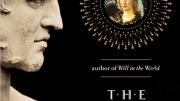The Swerve, by Cogan University Professor Stephen Greenblatt, is among the five finalists in the nonfiction category for a National Book Award. The book, described in Harvard Magazine's Right Now section, focuses on the poem De Rerum Natura ("On the Nature of Things"), written by the Roman Lucretius more than two millennia ago. The work's allegedly subversive qualities kept it buried from view for almost a thousand years, but its poetic beauty helped it survive and eventually re-emerge. Greenblatt tells how this happened and argues that the long poem has exercised an important influence on modern thought. As his own scholarship has most often targeted Shakespeare and the Renaissance, the new volume is, in a way, a swerve in Greenblatt's own career.
Greenblatt will give a talk sponsored by the Mahindra Humanities Center, at Harvard's Barker Center, on October 26. The speech, titled "Aesthetic Toleration: Lucretius and the Survival of Unacceptable Ideas," begins at 6 p.m.
Other National Book Awards finalists with Harvard connections include:
- poet Adrienne Rich ’51, Litt.D. ’90, for Tonight No Poetry Will Serve: Poems 2007-2010;
- fiction writer Edith Pearlman ’57, for her short-story collection Binocular Vision;
- poet Carl Phillips ’81 (who reads his 2008 Phi Beta Kappa poem here), for his book Double Shadow.
In addition, poet John Ashbery ’49, Litt.D. ’01, will receive the 2011 Medal for Distinguished Contribution to American Letters at the November 16 National Book Awards ceremony, which will be hosted by actor and author John Lithgow ’67, Ar.D. ’05.









